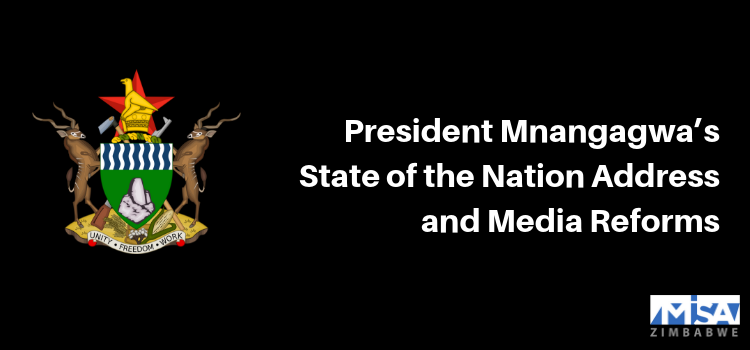MISA Zimbabwe cautiously welcomes President Emmerson Mnangagwa’s mention of the Broadcasting Services Act (BSA) as among other laws that will be amended during the session of the Ninth Parliament of Zimbabwe.
In his State of the Nation Address during the opening of this parliament’s First Session in Harare on 18 September 2018, President Mnangagwa also spoke on the need to finalise and debate new Bills such as the Cybersecurity and Cybercrimes Bill, the Data Protection Bill and the Electronic Transactions and Electronic Commerce Bill.
MISA Zimbabwe has consistently called for the amendment of the now outdated BSA, to ensure among other considerations, it reflects the technologically driven changes the broadcasting sector has gone through.
We, therefore, hope that concrete steps will be taken towards democratising the broadcasting sector. This will also entail the transformation of the Zimbabwe Broadcasting Corporation (ZBC) into a truly independent broadcaster and licensing of the long overdue community radio stations.
The government has since realised that information communications technology is no longer a clearly distinguishable field from broadcasting. To this end, the government announced plans to merge the Postal and Telecommunications Regulatory Authority of Zimbabwe with the Broadcasting Authority of Zimbabwe.
However, the President in his address did not mention the requisite legislative reforms to effect this merger.
Meanwhile, the three cyber law Bills have been in development since 2013. During his tenure, former President Robert Mugabe twice announced his intention to finalise the cyber law Bills. Unfortunately, not much was achieved in that regard as the Bills remained in the form of ministerial drafts.
President Mnangagwa did not mention consolidation of these Bills into one omnibus Bill, as was previously announced by the previous Minister of ICT and Cyber Security, Supa Mandiwanzira, in February this year. The final form they will take therefore remains to be seen.
There are also plans to table the Zimbabwe Media Commission (ZMC) Bill during this parliamentary session. The ZMC is currently established in terms of the Access to Information and Protection of Privacy Act (AIPPA). However, the 2013 Constitution requires that the Commission be guided by a formal Act of Parliament that empowers ZMC.
While the President did not expressly refer to amending AIPPA, the Bill in question will effect amendments to those sections of the law that currently deal with the establishment and functions of the Zimbabwe Media Commission.
It is MISA Zimbabwe’s hope that amendments to AIPPA will extend beyond the provisions dealing with the Zimbabwe Media Commission. MISA Zimbabwe insists on the complete overhaul of AIPPA instead of government’s preferred piecemeal approach to amending this notorious legislation.
Access to information
One key contentious issue with AIPPA is that it restricts the constitutional right to access to information. However, two recent developments, if followed to the letter, can assist in improving the transparency of government processes. The first development pertains to the incoming officers of Parliament.
According to Section 198 (a) of the Constitution, incoming officers of Parliament have to declare their assets within 30 days of taking their oath of office. The 30-day period expires on 5 October 2018. Failing to declare one’s assets is an act of misconduct in terms of Section 43 (nn) of the Officers of Parliament (Terms of Service) Regulations, 2018 (Statutory 24 of 2018).
The second positive development relating to government processes to access to information is linked to the press statement by the Minister of Information, Media and Broadcasting Services, Monica Mutsvangwa, who declared that key government decisions will be placed in the public domain as soon as is reasonably possible.
MISA Zimbabwe commends these steps aimed at fostering transparency in government processes. Members of the public and civil society are therefore urged to use such released information to keep track on government’s performance as well as holding it accountable to its commitments.
ENDS









